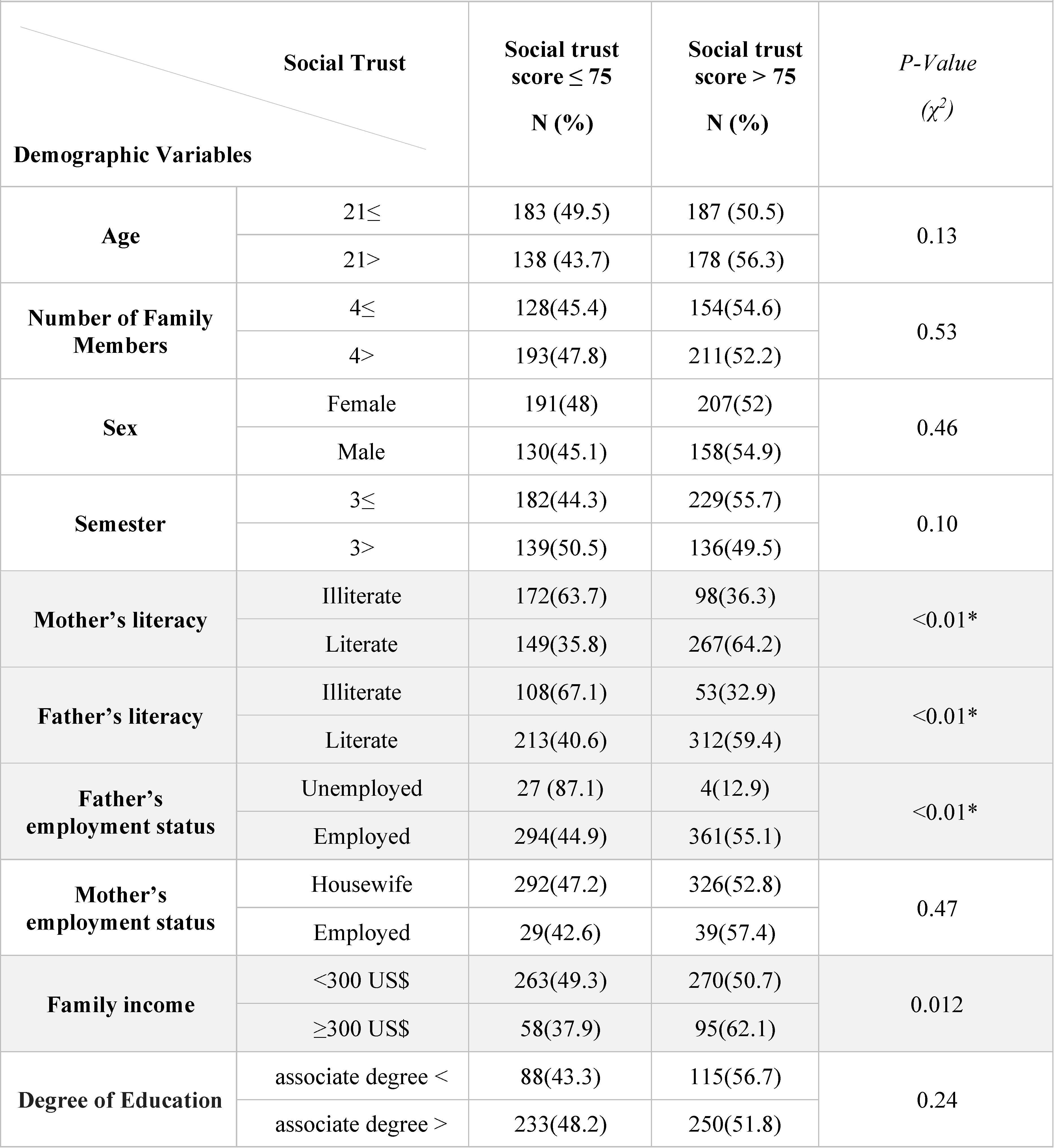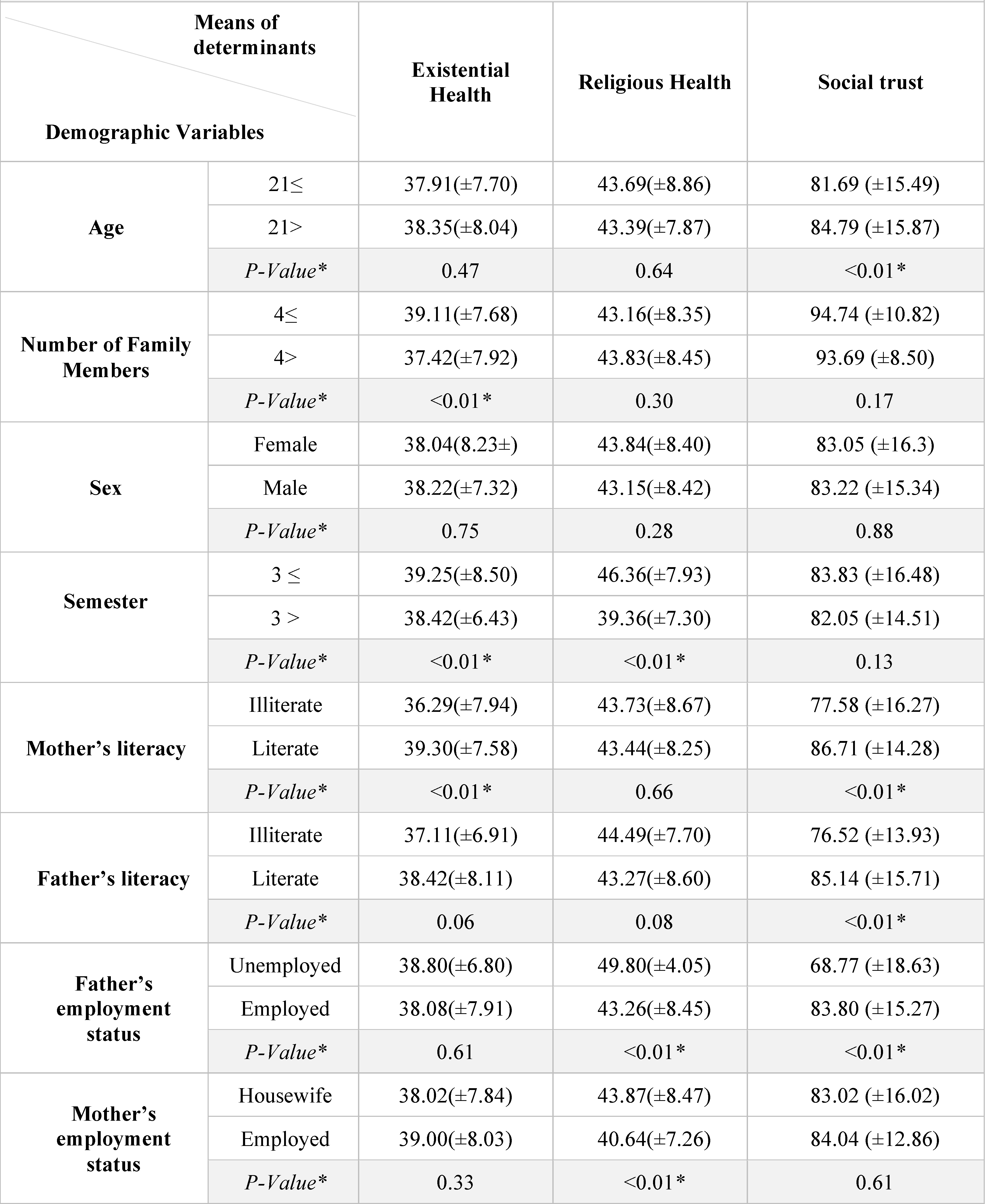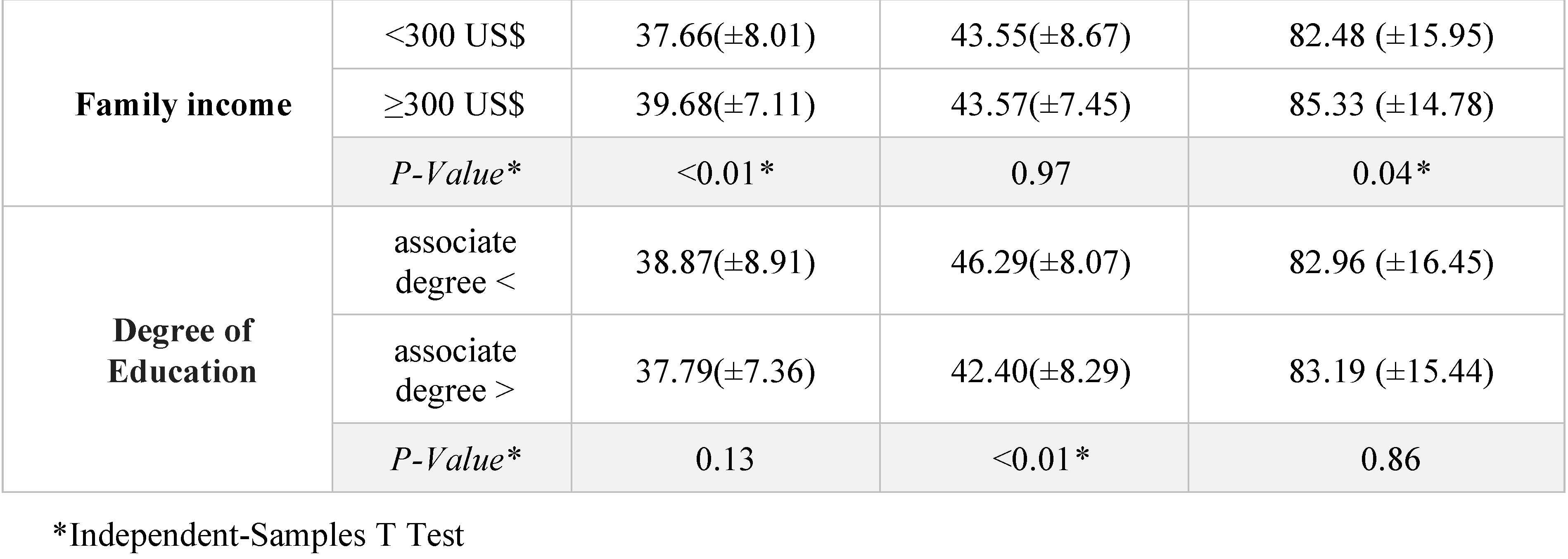The Relationship Between Spiritual Health and Social Trust Among Students
Abstract
:Introduction
Materials and Methods
Study design
Study population and data
Covariates
Statistical analysis
Ethical considerations
Results
Discussions
Limitations of the study
Conclusions
Conflict of interest disclosure
Compliance with ethical standards
Acknowledgments
References
- Moradi, A.; Sajjadi, H.; Vameghi, M.; Mohaqeqi Kamal, E.H.; Ghaedamini Harouni, G. A Study of Socio-Economic Determinants of Social Trust among Labor Children Referring to NGOs in Tehran. Refahj. 2016, 16, 77–86. [Google Scholar]
- Beverly, E.A.; Melanie, F.W.; Court, A.B.; Prokopakis, K.E.; Nedyalko, N.I. Patient-Physician Communication and Diabetes Self-Care. J. Clin. Outcomes Manag. 2016, 23, 509–518. [Google Scholar]
- Tham, S.G.; Ibrahim, S.; Hunt, I.M.; Kapur, N.; Gooding, P. Examining the mechanisms by which adverse life events affect having a history of self-harm, and the protective effect of social support. J Affect Disord. 2020, 263, 621–628. [Google Scholar] [CrossRef]
- Berggren, N.; Daunfeldt, S.O.; Hellström, J. Social trust and central-bank independence. Eur. J. Political Econ. 2014, 34, 425–439. [Google Scholar] [CrossRef]
- Matthes, J. Do Hostile Opinion Environments Harm Political Participation? The Moderating Role of Generalized Social Trust. Int. J. Public Opin. Res. 2013, 25, 23–42. [Google Scholar] [CrossRef]
- Dasic, B.; Devic, Z.; Denic, N.; Zlatkovic, D.; Ilic, I.D.; Cao, Y.; Jermsittiparsert, K.; Le, H.V. Human development index in a context of human development: Review on the western Balkans countries. Brain Behav. 2020, 10, e01755. [Google Scholar] [CrossRef] [PubMed]
- Evans, A.; Dunstan, F.; Fone, D.L.; Bandyopadhyay, A.; Schofield, B.; Demmler, J.C.; Rahman, M.A.; Lyons, R.A.; Paranjothy, S. The role of health and social factors in education outcome: A record-linked electronic birth cohort analysis. PLoS ONE 2019, 14, e0220771. [Google Scholar] [CrossRef]
- Abaszade, M.; Mirzaee, M. The Role of Religion in the Development of Social Trust Network (Case Study: Students of Tabriz University). Culture in the Islamic University 2014, 4, 199–224. [Google Scholar]
- Azimi, L. The Impact of Social Trust on Students’ Quality of Life. Iran. J. Soc. Sci. Stud. 2013, 10, 186–214. [Google Scholar]
- Kellezi, B.; Coupland, C.; Morriss, R.; Beckett, K.; Joseph, S.; Barnes, J.; Christie, N.; Sleney, J.; Kendrick, D. The impact of psychological factors on recovery from injury: A multicentre cohort study. Soc Psychiatry Psychiatr Epidemiol. 2017, 52, 855–866. [Google Scholar] [CrossRef]
- Jenaabadi, H. The Relationship of Personality Type, Social Trust and Social Desirability among the Homeless Adolescents Living in Zahedan Welfare Organization Hostels. Int. J. Psychol. 2017, 11, 5–27. [Google Scholar]
- Iravani, M. Factors affecting social trust among students (Case Study: Islamic Azad University of Khomeini Shahr). J. Basic Appl. Sci. Res. 2013, 3, 173–179. [Google Scholar]
- Kandovani, A.; Tsgiloo, F. Investigating the relationship between religiousness and social trust among M.A. students of Islamic Azad University of Tabriz. J. Sociol. Stud. 2013, 5, 77–96. [Google Scholar]
- Kiyakjori, S.; Afrasyabi, H. Study of social trust and its related factors among students. Sociol. Econ. Dev. 2013, 1, 143–165. [Google Scholar]
- Taha, A.A.; Eisen, A.M.; Abdul-Rahman, H.Q.; Abdul-Rahman, T.Q.; La, S.; Hanes, D.; Zouros, A. Spirituality and Quality of Life among Parents of Adolescents with Spina Bifida. West J Nurs Res. 2020, 193945920976407. [Google Scholar] [CrossRef] [PubMed]
- Roberts, T.J.; Gilmore-Bykovskyi, A.; Lor, M.; Liebzeit, D.; Crnich, C.J.; Saliba, D. Important Care and Activity Preferences in a Nationally Representative Sample of Nursing Home Residents. J Am Med Dir Assoc. 2018, 19, 25–32. [Google Scholar] [CrossRef]
- Fitzpatrick, S.A.; Haswell, M.R.; Williams, M.M.; Nathan, S.; Meyer, L.; Ritchie, J.E.; Jackson Pulver, L.R. Learning about Aboriginal health and wellbeing at the postgraduate level: Novel application of the Growth and Empowerment Measure. Rural Remote Health 2019, 19, 4708. [Google Scholar] [CrossRef] [PubMed]
- Henderson, A.K.; Walsemann, K.M.; Ailshire, J.A. Religious Involvement and Cognitive Functioning at the Intersection of Race/Ethnicity and Gender in Mid-Life and Older Adults. J Gerontol B Psychol Sci Soc Sci. 2021, 26, gbab034. [Google Scholar] [CrossRef]
- Macleod, J.; Davey Smith, G.; Heslop, P.; Metcalfe, C.; Carroll, D.; Hart, C. Psychological stress and cardiovascular disease: Empirical demonstration of bias in a prospective observational study of Scottish men. BMJ 2002, 324, 1247–1251. [Google Scholar] [CrossRef]
- Dhar, N.; Chaturvedi, S.; Nandan, D. Spiritual health scale 2011: Defining and measuring 4 dimension of health. Indian J Community Med. 2011, 36, 275–282. [Google Scholar] [CrossRef]
- Simington, J.A. Attitudes towards the old and death, and spiritual well-being. J Relig Health. 1996, 35, 21–32. [Google Scholar] [CrossRef] [PubMed]
- Li, T.; Wang, S. How to Improve the Public Trust of the Intelligent Aging Community: An Empirical Study Based on the ACSI Model. Int J Environ Res Public Health 2021, 18, 1971. [Google Scholar] [CrossRef]
- Richter, A.; Näswall, K. Job insecurity and trust: Uncovering a mechanism linking job insecurity to well- being. Work. Stress 2019, 33, 22–40. [Google Scholar] [CrossRef]
- Graafland, J.; Lous, B. Income Inequality, Life Satisfaction Inequality and Trust: A Cross Country Panel Analysis. J Happiness Stud 2019, 20, 1717–1737. [Google Scholar] [CrossRef]
- Gaidano, G.; Balocco, R.; Essa, W.A.; Turolla, A.; Barbato, R.; Dianzani, U.; Rizzi, M.; Ravinetto, R. European education corridors: Opportunity for academic solidarity. Lancet 2020, 395, 1343. [Google Scholar] [CrossRef] [PubMed]
- Piazza, J.A. Poverty, minority economic discrimination, and domestic terrorism. J. Peace Res. 2011, 48, 339–353. [Google Scholar] [CrossRef]
- Afshani, A. A Study about Relationship between Religiousness and Social Trust. Soc. Sci. 2010, 17, 185–217. [Google Scholar] [CrossRef]
- Traunmüller, R. Moral Communities? Religion as a Source of Social Trust in a Multilevel Analysis of 97 German Regions. Eur. Sociol. Rev. 2010, 27, 346–363. [Google Scholar] [CrossRef]
- Chuah, S.H.; Gächter, S.; Hoffmann, R.; Tan, J.H.W. Religion, discrimination and trust across three cultures. Eur. Econ. Rev. 2016, 90, 280–301. [Google Scholar] [CrossRef]
- Aghdam, A.; Elmi, M.; Yekan, M.D. A Study of Social Factors Related to Social Trust among High-School Teachers of Marand’s Department of Education. J. Appl. Sociol. 2011, 23, 167–184. [Google Scholar]
- Momennasab, M.; Shadfard, Z.; Jaberi, A.; Najafi, S.S.; Hosseini, F.N. The Effect of Group Reflection on Nursing Students’ Spiritual Well-being and Attitude Toward Spiritual Care: A randomized controlled trial. Invest Educ Enferm. 2019, 37, e09. [Google Scholar] [CrossRef] [PubMed]
- Hvidt, N.C.; Nielsen, K.T.; Kørup, A.K.; et al. What is spiritual care? Professional perspectives on the concept of spiritual care identified through group concept mapping. BMJ Open 2020, 10, e042142. [Google Scholar] [CrossRef] [PubMed]
 |
 |
 |
 |
 |
 |
© 2008 by the author. 2008 Farzin Rezaei, Hero Khwrshid Hassan, Arezoo Fallahi, Reza Ghanei Gheshlagh, Shahram Sadeghi, Parisa Fallahi and Babak Nemat
Share and Cite
Rezaei, F.; Hassan, H.K.; Fallahi, A.; Gheshlagh, R.G.; Sadeghi, S.; Fallahi, P.; Nemat, B. The Relationship Between Spiritual Health and Social Trust Among Students. J. Mind Med. Sci. 2021, 8, 100-107. https://doi.org/10.22543/7674.81.P100107
Rezaei F, Hassan HK, Fallahi A, Gheshlagh RG, Sadeghi S, Fallahi P, Nemat B. The Relationship Between Spiritual Health and Social Trust Among Students. Journal of Mind and Medical Sciences. 2021; 8(1):100-107. https://doi.org/10.22543/7674.81.P100107
Chicago/Turabian StyleRezaei, Farzin, Hero Khwrshid Hassan, Arezoo Fallahi, Reza Ghanei Gheshlagh, Shahram Sadeghi, Parisa Fallahi, and Babak Nemat. 2021. "The Relationship Between Spiritual Health and Social Trust Among Students" Journal of Mind and Medical Sciences 8, no. 1: 100-107. https://doi.org/10.22543/7674.81.P100107
APA StyleRezaei, F., Hassan, H. K., Fallahi, A., Gheshlagh, R. G., Sadeghi, S., Fallahi, P., & Nemat, B. (2021). The Relationship Between Spiritual Health and Social Trust Among Students. Journal of Mind and Medical Sciences, 8(1), 100-107. https://doi.org/10.22543/7674.81.P100107



